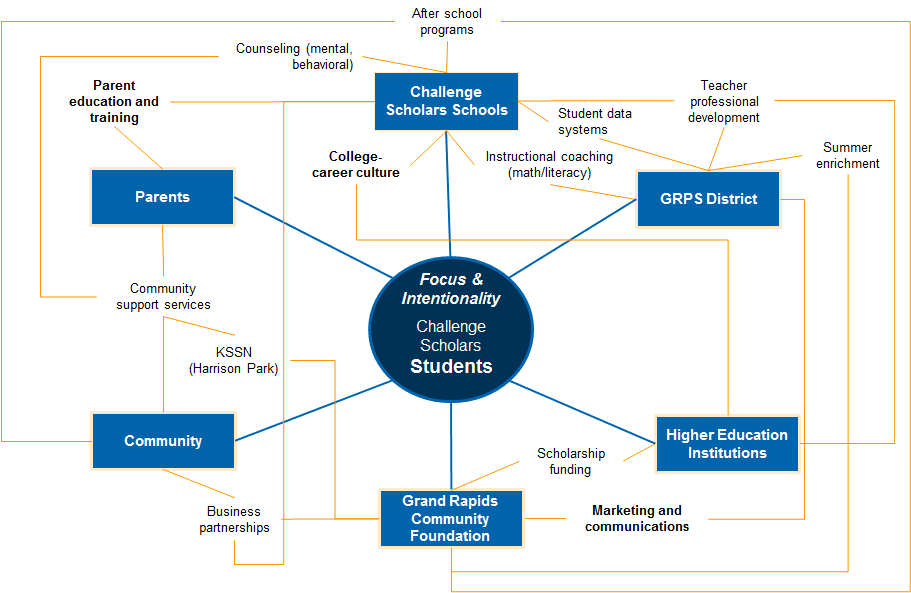On May 6, 2014, I was fortunate to be with a group of students, parents, and community members gathered at an auditorium in Grand Rapids, Michigan, to celebrate the first class of “Challenge Scholars”. Many of these students, now in sixth grade, will be the first in their families with an opportunity to attend college. The excitement in the room was palpable. Media, including several local television stations, were on hand to cover the event. As each one of the 137 sixth grade students walked down the stage as their name was called, proud parents looked on in awe.
Challenge Scholars is a unique initiative that is intended to improve college access and success in a town where only 34% of adults possess even a 2-year degree that 62% of jobs will require in 2018. It is a long-term partnership between the Grand Rapids Community Foundation and Grand Rapids Public Schools designed to help students successfully prepare for college or other post-secondary career training. Many college scholarships focus on providing students with financial assistance, neglecting the more complex challenges around college readiness. A consistent theme with such programs, including the first widely known “promise program” called Kalamazoo Promise in Grand Rapids’ neighboring town of Kalamazoo, Michigan, has been that while they improve college access, students still struggle with readiness and ultimately, completion.
Challenge Scholars is unique in that it focused on providing wrap-around supports and improving academic preparation starting in sixth grade. Supports are provided to the students as well as their parents. While the community foundation and the school district are the primary partners, the initiative also includes higher education institutions, community-based organizations, faith-based organizations, and local businesses. The systems map above, which was originally developed in the spring of 2013 and continues to be refined, captures the different facets of the initiative.
Truly systemic approaches are still rather new in education. Different educational entities continue to be siloed due to funding streams, competing priorities, and lack of time and will. However, a handful of “breakout” examples, including Challenge Scholars and the Roadmap Project in the Seattle area, have begun to emerge over the past few years. A few key lessons are helpful to keep in mind are such initiatives are planned and carried out:
- It Takes a Village: While schools are tasked with tackling the challenge of academic achievement, there are also factors beyond the classroom that contribute to the difficulty in closing persistent achievement gaps. A systemic effort, by definition, involves schools partnering with community-based organizations, social services, faith-based organizations, local philanthropic entities, and local businesses, to ensure that students have safe and nurturing environments, not just when they are in school, but also when they are in their homes and communities.
- Be Patient About Outcomes: Systemic change efforts are complex and cumbersome beasts with non-linear relationships between effort and outcomes. Several of the long-term outcomes, such as closing the achievement gap, raising graduation rates, improving college access and success, take years to accomplish. It might take ten years, but in the words of a wise colleague, “ten years is better than never.” That doesn’t mean, however, that one doesn’t evaluate or learn from the initiative in the interim, which brings us to the final lesson,
- Never Stop Learning: We often hear about the tension between “accountability” and “learning” when it comes to social sector undertakings. However, the only accountability that matters, at least in the early stages of a systemic initiative, is “accountability to learning.” In other words, holding various partners in the effort accountable to learning the right approaches and practices as things unfold, and making sense of (even incomplete) data to test strategies, fail fast, and be bold, in service to succeeding in a sustainable way in the long term.
At the auditorium in Grand Rapids, as each one of the 137 Challenge Scholars walked down the stage, the banner behind them read “every dream begins with a challenge.” In many ways, the initiative is a challenge, not only for the students, but also (and more importantly) for the community of Grand Rapids. Can the different entities (schools, community organizations, businesses, higher education) leave their individual priorities and incentives aside to truly collaborate for student success? Can they muster the right combination of patience, urgency, and a thirst for learning, that would set them up for long-term success? Anyone thinking seriously about a systems approach in education would be well-advised to consider these questions.

